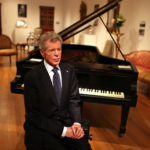By Richard Ammon
GlobalGayz.com
September 2012
Geography is Not Simple
First, get the Antilles Islands sorted out in your mind; it’s not easy. Overall, the Caribbean Antilles (antilles is an ancient word meaning islands) are divided into two major groups: the larger “Greater Antilles” to the north and west, includes Cuba, Jamaica, Haiti, the Dominican Republic and Puerto Rico. Then there are smaller “Lesser Antilles” in the southeast Caribbean. The Lesser Antilles are broken down into two other groups of islands: the Leeward Antilles, close to Venezuela, and the Windward Antilles northeast of Venezuela. (Click on the map to enlarge) What’s also confusing is another group of ‘Leeward Islands’, northeast and separate from the Leeward Antilles.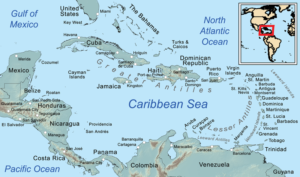
In this mix of dozens (41?) of island-states (all part of a huge archipelago chain of islands stretching from Venezuela to Florida) there are six islands that are within the influence of Netherlands (Holland), in a sort of ‘commonwealth’ association. Some are independent states now and some have the status of Dutch municipalities.
These six are divided into two groups: Leeward (Netherlands) Antilles: Aruba, Boniare and Curacao. The other group is called the Windward (Netherlands) Antilles of Sint Maarten, Saba, and Sint Eustatius. The distance from Aruba in the south to Sint Maartin in the north is about 597 miles (960.57 kilometers); they are far apart and tourists do not usually go to both on one trip. (See this comparison of the two tourist-popular islands.)
The Island Country of Curacao
Curacao is a small Caribbean island that became an independent country within the Kingdom of the Netherlands on October 2010. See this brief overview of Curacao. Here it’s not hard to quickly discern the attitude here toward LGBT people. Click on GayCuraco.com (launched 2005) and read:
“Welcome. ‘Live and Let Live’ or ‘Biba i laga Biba’. That’s the public and touristic philosophy on Curaçao.
This in-depth website serves as a resource for LGBT travelers looking for help in navigating the land and life of the island and finding where to stay and what to do and see. “We are committed to welcoming all visitors to the island and hope that this new site will help spread the word to the gay and lesbian community worldwide.
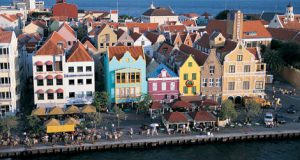
Gaycuracao.com highlights the many tourism partners on island that are members of the International Gay & Lesbian Travel Association and provides a listing of places to gather and meet other gay travelers, as well as locals.” With 17 proud members, Curaçao is proud to have the largest IGLTA membership in all of the Caribbean.
“It is important to us that it’s known to the gay & lesbian community that everyone is welcome in Curaçao. Our island offers diverse culture, art galleries, beaches, museums, fine accommodations and exquisite cuisine that are enjoyed by all visitors to the island,” commented André Rojer of CHATA (Curaçao Hospitality and Tourism Association), who has labored tirelessly to coordinate the gay-friendly efforts of the tourist industry in Curacao.
First Gay Center in Curacao
In a unusual Caribbean first, Curaçao opened a gay centre in 2010.. With its activities Casa Rosada (pink house), located in the neighborhood of Otrabanda, hopes to break the taboo on homosexuality.
Education and information are badly needed, says FOKO (Fundashon Orugyo Korsou) the Caribbean island’s gay group. Founder Thirza Stewart stresses how important that is: “The silence that falls when you tell your mother you are gay is very hard.”
The guests attending the opening received a glass of pink champagne. Said one happy but realistic 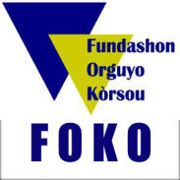 lesbian guest, “why should I apologize if I like women? It’s hard to be open about my sexual preference. The consequences here in Curcao can be quite painful–unlike what the tourist office says. Certain people are no longer welcome at home.”
lesbian guest, “why should I apologize if I like women? It’s hard to be open about my sexual preference. The consequences here in Curcao can be quite painful–unlike what the tourist office says. Certain people are no longer welcome at home.”
According to FOKO neither Curacao Society in general, nor its politicians in particular “are sufficiently conscious of the fact that gay rights in the Dutch Kingdom in Europe are based on equality and anti-discrimination principles that are enshrined in the constitution of Curacao… recently derogatory remarks have been made about homosexuality and same-sex relationships…” See this report from Suzanne Gomez, Chair and Dudley Ferdinandus, Coordinator of FOKO.
Being Family and Being Gay
Gay and lesbian people, Thirza Stewart says, not only face prejudice at home but also on the work floor. She knows several people who were refused a job for being gay. Foko head Mario Kleinmoedig confirms gay people on Curaçao face an uphill battle, though things are not as bad as in Jamaica, where they fear for their lives.
Kleinmoedig stresses how difficult it is to have open gay relationships given all the social pressure. He says it is important to lower that pressure but also to teach gay people how to cope with it. “We want to raise the self-esteem of gay people. Homosexuality simply exists—that is a discussion we are no longer interested in. That’s history.”
Someone who lives close to Casa Rosada said he is worried by the opening of the gay centre. “Further down is a brothel, and over there is a hotel where people rent rooms for a few hours. There are many taboos here. At the same time, a lot of down-low activity happens, especially at night. I hope this gay center does not add to that.”
Gay Marriage
Same-sex marriages are not performed in Aruba, Curaçao or Sint Maarten, the major islands of the Netherlands Caribbean commonwealth. Many of the residents of the islands are Roman Catholic and Christian Protestant so the issue of same-sex marriage is highly opposed. However after several court rulings in Holland and locally, the islands were forced to recognize any marriage (including same-sex marriages) registered anywhere in the Netherlands Kingdom. Since marriage in Holland is open to people of any gender, marriages registered there have to be accepted in the islands.
However, non-equal treatment of married couples is allowed in 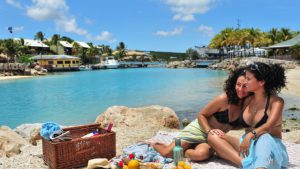 the Antilles. In 2009, the Common Court of Justice of the Netherlands Antilles and Aruba ruled in an appeal case that a the partner in a same-sex marriage does not have to be offered health care benefits in a government employees health care scheme. The court ruled that regulations can exist which are based on the opposite-sex marriage definition existing in the Netherlands Antilles.
the Antilles. In 2009, the Common Court of Justice of the Netherlands Antilles and Aruba ruled in an appeal case that a the partner in a same-sex marriage does not have to be offered health care benefits in a government employees health care scheme. The court ruled that regulations can exist which are based on the opposite-sex marriage definition existing in the Netherlands Antilles.
Another court ruled in a case of enrollment of a homosexual partner in a collective health insurance scheme, stating explicitly that if enrollment was only possible for male-female married or unmarried straight couples, thus excluding same-sex couples, this would constitute discrimination. But if non-married couples had been excluded, there would be no obligation for enrollment of same-sex marriage. So the rulings are not settled yet.
Meeting Gays in Curacao
Once commentator wrote that he could find more ‘dates’ from homophobic Jamaica than he could from Curacao. He attributed this to an ironic situation. Although begin gay in Curacao is safer than Jamaica, in general, many closeted and married men can easily check out Adam4Adam, a hook-up site popular in the Caribbean. However, in doing so they might recognize the faces of other profilers and fear being outed if they responded. “But in Jamaica, the homophobic Rastafarians and the equally homophobic God-fearing Evangelicals would not even know what Adam4Adam was. The gay profilers in Jamaica probably feel safer to give their stats and show their face pics than those in Curacao.”
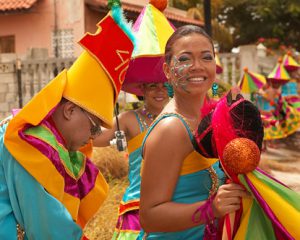 Unlike so many other islands in the Caribbean, Curacao is rather safe all over. The natives are friendly for the most part–too friendly for those on the down-low. The same commentator also felt that Curacao gay life was too age-oriented with the few bars there catering to specific ages. “Mixing was all but impossible,” he wrote.
Unlike so many other islands in the Caribbean, Curacao is rather safe all over. The natives are friendly for the most part–too friendly for those on the down-low. The same commentator also felt that Curacao gay life was too age-oriented with the few bars there catering to specific ages. “Mixing was all but impossible,” he wrote.
Another blogger posted his opinion: “The Caribbean can be chilly when it comes to welcoming gays, wrote one Canadian. On the three Antilles I visited, local activists tried to convey the importance of discretion, a sort of “don’t ask, don’t tell” that was hard for me, as a Canadian, to understand.
Carnival Curacao
The highlight of the year is the Curaçao Pride(Curaçao Carnival). This event takes place every year around the end of September and beginning of October. During the 5 days that the Pride lasts there are plenty of parties and activities you can enjoy.
It includes ‘Get Wet Weekend’ with movies, pool parties and boat trips and much cruising and revelry. The weekend is considered Curacao’s major Gay Pride event. (photo right)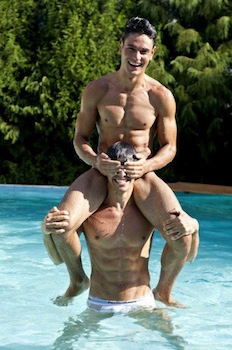
Christmas time is yet another period where there is almost always lots of parties and activities. Said one local, “Scream when you see carnival group T’aki Tin in the parades, which has the highest concentration of LGBT participants. More ‘Get Wet’ information can be found at www.gaycuracao.com
The Social Scene
“The gay and lesbian community is quite large,” explains Madame Jeanette Pepper, of Curacao GayPlasa Foundation, organizers of Curacao’s annual Gay Pride event. “They are not all out, but they occupy positions throughout all layers of the community,” says Pepper,.
As for venues, these constantly changes, so a visitor will need to check local listings upon arrival. Here are some from the Internet but there is no assurance they are still open. “The G-Lounge, Williwood, Wet & Wild and Tutu Tango, where every second Saturday of the month is a party by Curaçao GayPlasa. Gay couples also frequent the so-called straight clubs, as all of the beach bars and nightclubs on the island have such a relaxed and gay friendly attitude. So, places like Papagayo, St.Tropez, Mambo, Bermuda, Pampus, Mundo Bizarro, Omundo and De Heeren are all very gay friendly as well,” says Pepper, from GayPlasa, who also organize routine gay events throughout the year.
There is also a Mr Gay Curacao contest each year to select a candidate for the Mr Gay World Contest held at different places around the globe.
Literary Scene
Claude Douglas’ book ‘Homosexuality in the Caribbean—Crawling Out of the Closet‘ ( March 24, 2008; 60 pages) examines organized efforts to decriminalize homosexuality in the Caribbean. Cuba, the Cayman Islands, Turks and Caicos, Montserrat and Barbados are destinations Douglas cites as having shown great progress in the struggle.
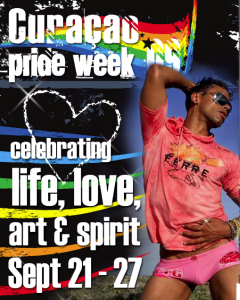 “It is a sociological analysis and an erudite commentary on sexuality as a critical function of human identity. In the book Professor Douglas discusses a taboo issue: the maneuvers of homosexuality within the English speaking Caribbean. The Grenadian professor writes against the prevailing idea of a specific brand of Judeo-Christian theology, which affirms heterosexual norm — a religious orientation that pervades the Caribbean mind. While the book speaks directly to the homophobic particulars of the Caribbean experience, it fails to explore fully, how relationships of justice are exercised within the milieu of the Caribbean’s sexual ethics…” (From IRNweb.org)
“It is a sociological analysis and an erudite commentary on sexuality as a critical function of human identity. In the book Professor Douglas discusses a taboo issue: the maneuvers of homosexuality within the English speaking Caribbean. The Grenadian professor writes against the prevailing idea of a specific brand of Judeo-Christian theology, which affirms heterosexual norm — a religious orientation that pervades the Caribbean mind. While the book speaks directly to the homophobic particulars of the Caribbean experience, it fails to explore fully, how relationships of justice are exercised within the milieu of the Caribbean’s sexual ethics…” (From IRNweb.org)
Another reviewer wrote: “Professor Douglas has created a buzz in the region by his most recent publication. The book, entitled ” Homosexuality in the Caribbean, Crawling out of the closet” is a study of attitudes towards Homosexuality throughout the English Speaking Caribbean, spanning the homophobic reality of Jamaica, the ambivalence of the majority of Eastern Caribbean isles, to the open affirmation of alternative lifestyles in Barbados. The books author Professor Claude Douglas said he intended that the project provide a sociological analysis of Caribbean sexual identity as well as to provide critical insight on sexuality as a critical function of human identity.”
The author also argues that the Caribbean’s attitude to homosexuality is changing. Tolerance has increased significantly in recent years and partly blames the United States’ cultural invasion of the Caribbean. “Yesterday’s deviants will become today and tomorrow’s norms. Let us take, for example, the wearing of earrings by men. This was actually taboo in Grenada many years ago. Today, there are men who appear almost feminine,” Douglas said in an interview with the Caribbean Media Corporation. “As the society evolves, people become more accepting of certain behaviour, and we see the trend developing right now in Grenada.”
Among those who agree that a change in attitude is needed at the highest levels of society is former Barbados attorney general and present opposition Leader Mia Mottley who said “A government in a pluralistic society must accommodate and respect the human rights and dignity of each individual. To that extent, a law, which seeks to discriminate in a society whose history has been scarred with the cancer of discrimination, has in fact, to be reformed.”
Dark History
Although the Caribbean played a huge role in the slave trade, it is rarely if ever mentioned. Unlike the very public memorials of the Jewish Holocaust, rarely are the ills of slavery acknowledged nor is there any effort to repent or further understand the documented history of how it happened and the immense toll it took on humanity.
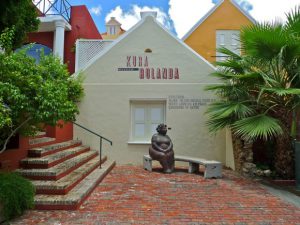 That is, until the Kura Hulanda Hotel compound came along. Within the confines of an eight-block radius of 17th and 18th century Dutch architecture buildings, now a Unesco World Heritage site, with cobblestone streets, shops, multiple restaurants and bars, a spa, casino, courtyards, and winding gardens all leading to a museum largely dedicated to the slavery. (photo right)
That is, until the Kura Hulanda Hotel compound came along. Within the confines of an eight-block radius of 17th and 18th century Dutch architecture buildings, now a Unesco World Heritage site, with cobblestone streets, shops, multiple restaurants and bars, a spa, casino, courtyards, and winding gardens all leading to a museum largely dedicated to the slavery. (photo right)
Museum Kurá Hulanda is situated on the site of a former slave yard and merchant’s home in central Willemstad–the capital city of Curaçao. Museum Kurá Hulanda is the nexus of the Kurá Hulanda, which in the language of the locals (Papiamentu) translates to “Dutch Courtyard.” The entire complex was conceived and built by Jacob Gelt Dekker. The museum is comprised of 15 buildings and spans more than 16,000 square feet.
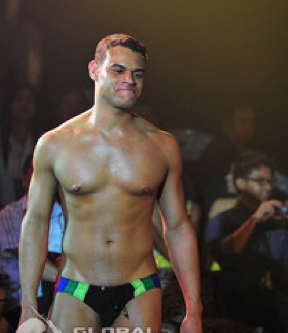
So it is that little Curacao has much diversity to offer, from colorful festivals to private closeted lives, from modern prosperity to a slavery memorial.
(photo right: Mr Gay Curacao 2011)
Also see:
FOKO (Fundashon Orugyo Korsou)
Suzanne Gomez, Chair;
Dudley Ferdinandus Coordinator
De Rouvilleweg 9c Curacao,
Tel: 4629944,
curafoko@yahoo.com
Gay Curacao website
Get Wet Designers
Madame Jeanette’s Events
Orbitz Travel
http://www.orbitz.com/App/PerformMDLPDealsContent?deal_id=gay-curacao&cnt=OVI
Google Images for Gay Curacao
Curacao After Dark (NY Times, 2012)



